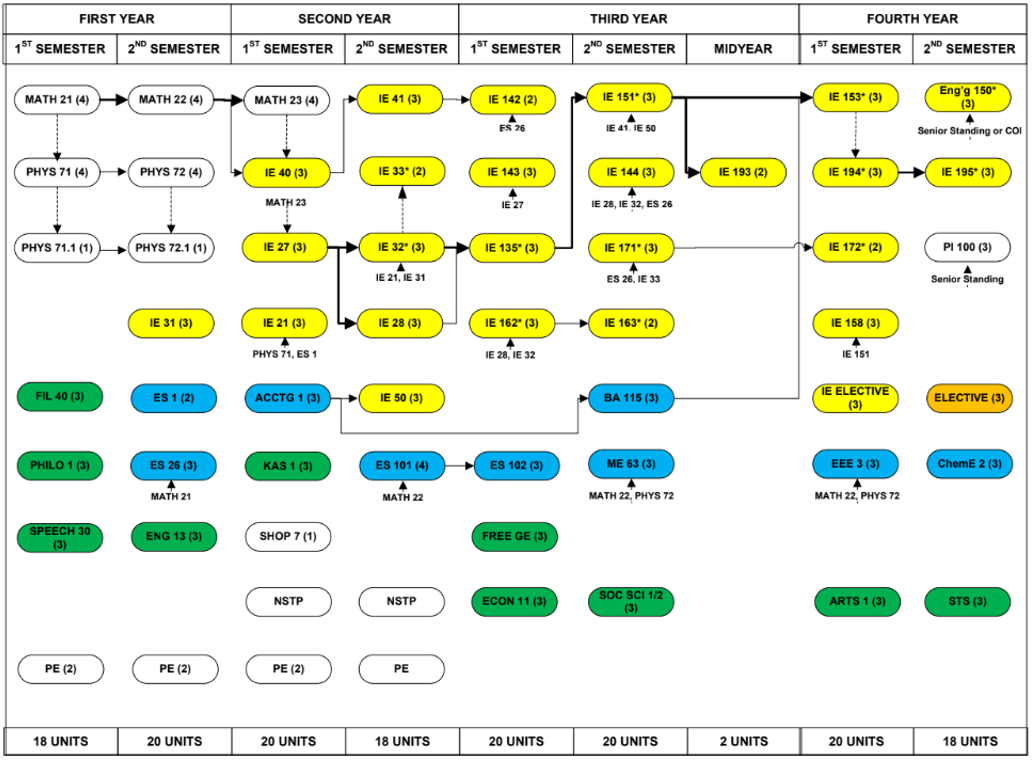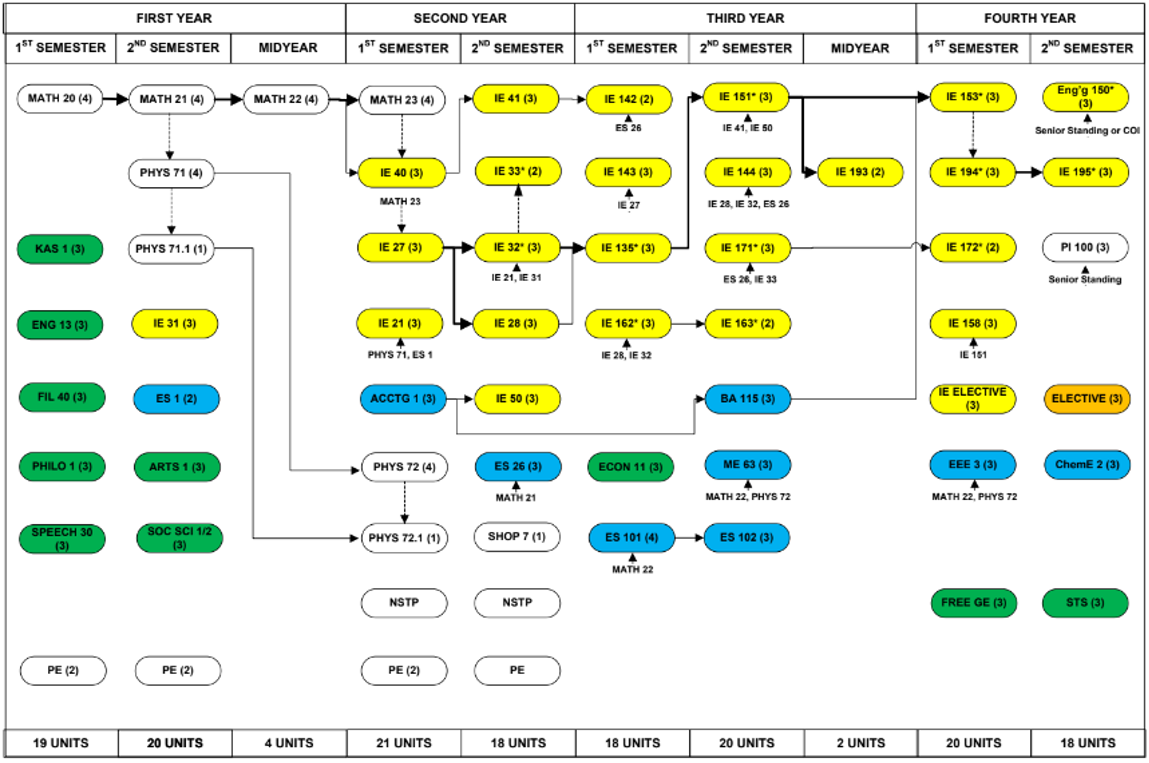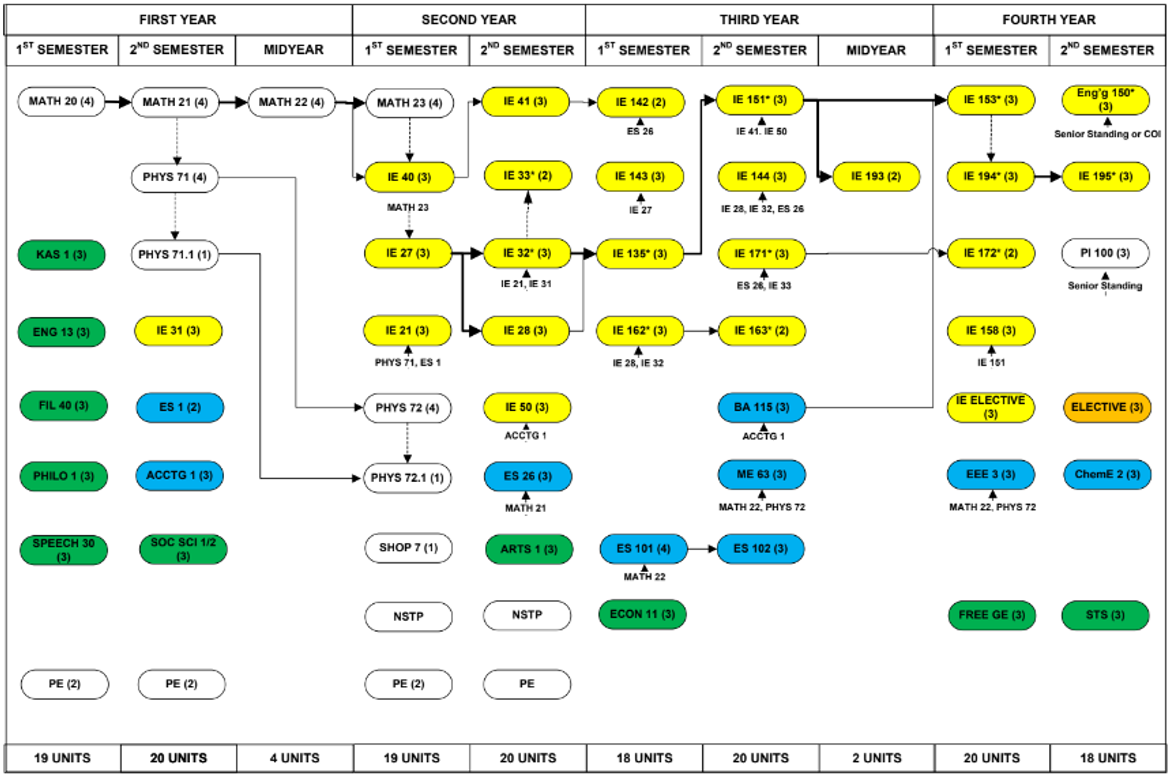Undergraduate Program
Undergraduate Studies: BS Industrial Engineering, 2018 Curriculum
OBJECTIVE
The objective of the Bachelor of Science in Industrial Engineering program is to provide a sound foundation in science and engineering in preparation for a professional Industrial Engineering career. The main tracks of the program are Production Systems, Operations Research, Human Factors and Ergonomics, and Information Systems.
FRESHMEN ENROLLMENT QUOTA
One hundred and ten (110) students.
DURATION
STEM TRACK: 4 years, 156 units
NON-STEM TRACK: 4 years, 160 units
The image below displays the undergraduate IE curriculum in flowchart form.
STEM TRACK

NON-STEM TRACK (Option 1)

NON-STEM TRACK (Option 2)

BS Industrial Engineering Program of Study
General Education Courses, 30u total
- GE Program
- Eng 13 Writing as Thinking (3 u.)
- Fil 40 Wika, Kultura, at Lipunan (3 u.)
- Arts 1 Critical Perspective in the Arts (3 u.)
- Soc Sci 1 Foundations of Social Science / Soc Sci 2 Social, Economic and Political Thought (3 u.)
- STS 1 Science, Technology and Society (3 u.)
- Kas 1 Kasaysayan ng Pilipinas (3 u.)
- Philo 1 Philosophical Analysis (3 u.)
- Program Prescribed General Education Courses
- Econ 11 Markets and the State (3 u.)
- Speech 30 Public Speaking and Persuasion (3 u.)
- Free GE (3 u.)
Foundation Courses, 34u total
- Math 20 Precalculus: Functions and their Graphs (4 u.) *NON-STEM TRACK only
- Math 21 Elementary Analysis I. Prereq: via High School Basic Calculus from the STEM or equivalent strand of K-12, Math 20 Validation Exam, or Math 20 (4 u.)
- Math 22 Elementary Analysis II. Prereq: Math 21 (4 u.)
- Math 23 Elementary Analysis III. Prereq: Math 22 (4 u.)
- Physics 71 Elementary Physics I. Coreq: Math 21 (4 u.)
- Physics 71.1 Elementary Physics I Laboratory. Coreq: Physics 71(1 u.)
- Physics 72 Elementary Physics II. Prereq. Physics 71 (4 u.)
- Physics 72.1 Elementary Physics II Laboratory. Prereq: Phys 71.1; Coreq: Phys 72 (1 u.)
- ES 1 Engineering Drawing. Prereq: None (2 u.)
- ES 101 Mechanics of Particles and Rigid Bodies. Prereq: Math 22 (4 u.)
- ES 102 Mechanics of Deformable Bodies. Prereq: ES 101 (3 u.)
- ES 26 Introduction to Computer Programming. Prereq: Math 21 (3 u.)
Core Courses, 67u total
- IE 21 Industrial Materials and Processes (3 u.)
- IE 27 Probability and Statistics for Industrial Engineering (3 u.)
- IE 28 Statistical Analysis for Industrial Engineering (3 u.)
- IE 31 Industrial Organization and Management (3 u.)
- IE 32 Work Study and Measurement (3 u.)
- IE 33 Systems and Procedures (2 u.)
- IE 40 Mathematical Methods for Industrial Engineering (3 u.)
- IE 41 Operations Research I (3 u.)
- IE 50 Engineering Economics for Industrial Engineering (3 u.)
- IE 135 Quality Control (3 u.)
- IE 142 Operations Research II (2 u.)
- IE 143 Stochastic Processes in Engineering (3 u.)
- IE 144 Systems Simulation (3 u.)
- IE 151 Production and Service Systems (3 u.)
- IE 153 Project Development and Management (3 u.)
- IE 158 Supply Chain Management for Industrial and Service Systems (3 u.)
- IE 162 Ergonomics I (3 u.)
- IE 163 Ergonomics II (2 u.)
- IE 171 Information Systems I (3 u.)
- IE 172 Information Systems II (2 u.)
- IE 193 Industrial Engineering Practicum (2 u.)
- IE 194 Industrial Engineering Capstone Project I (3 u.)
- IE 195 Industrial Engineering Capstone Project II (3 u.)
- Engg 150 Introduction to Technology Entrepreneurship (3 u.)
Cognate Courses, 16u total
- Acctg 1 Introduction to Financial Accounting. Prereq: None (3 u.)
- BA 115 Management Accounting. Prereq: BA 99.2/Acctg. 1 (3 u.)
- ChemE 2 Elementary Chemical Engineering. Prereq: None (3 u.)
- EEE 3 Elementary Electrical Engineering. Prereq: Math 54, Physics 72. (3 u.)
- ME 63 Thermodynamics. Prereq: Math 22, Physics 72 (3 u.)
- Shop 7 General Shop Practice (1 u.)
Mandated Course, 3u total
- PI 100, The Life & Works of Jose Rizal, (3 u.)
Elective Courses, 6u total
- IE Elective, (3 u.)
- Elective, (3 u.)
Physical Education and NSTP Courses, 14u total
- PE, (2)u
- PE, (2)u
- PE, (2)u
- PE, (2)u
- NSTP, (3)u
- NSTP, (3)u
Total number of units: 170
List of Approved IE Electives
- IE 122 Product Design and Development (Pre-req: IE 21. Co-req: Shop 7 ) (3 u.)
- IE 136 Manufacturing Systems (Pre-req: 4th year standing) (3 u.)
- IE 138 Manufacturing Management (Pre-req: 4th yr. standing ) (3 u.)
- IE 139 Reliability Engineering for Industrial Systems (Pre-req: IE 135; IE 143) (3 u.)
- IE 152 Manufacturing Planning and Design (Pre-req: IE 151. Co-req: IE 144) (3 u.)
- IE 161 Safety and Health Management (Pre-req: IE 160 or COI) (3 u.)
- IE 173 Data Analytics for Industrial Engineering (IE 171or equiv, IE 27or equiv) (3 u.)
- IE 174 Software Tools for Industrial Engineering (Pre-req: ES 26 or COI) (3 u.)
- IE 197 Special Topics (Pre-req: None) (3 u.)
- IE 198 Special Problems (Pre-req: Senior Standing) (3 u.)
List of Approved Non-IE Electives
- BA 151 Human Behavior in Organizations (Pre-req: BA 101 or COI) (3 u.)
- BA 152 Human Resource Management (Pre-req: BA 151 or COI) (3 u.)
- BA 170 Introduction to Marketing Management (Pre-req: BA 101) (3 u.)
- Econ 100.1 Introduction to Macroeconomic Theory and Policy (Pre-req: Math 11 or COI) (3 u.)
- Econ 100.2 Introduction to Microeconomic Theory and Policy (Pre-req: Math 11 or COI) (3 u.)
- EgyE 101 Introduction to Energy Engineering (Pre-req: Senior Standing) (3 u.)
- EnE 31 Technology and Environment (Pre-req: Prereq: 3rd yr. standing) (3 u.)
- MetE 143 Elements of Materials Science (Pre-req: Chem 16, Physics 72) (3 u.)
- Psych 101 General Psychology (3 u.)
*Other courses acceptable to the degree program sponsor
BS Industrial Engineering Program of Study
IE 21 Industrial Materials & Processes. Industrial materials & processes & their effects on production system decisions. Pre-requisites: Physics 71, ES 1. Credit: 3 units (3 hrs lecture).
IE 27 Probability and Statistics for Industrial Engineering. Applications of logic & probability in industrial engineering; random variables & their functions, descriptive statistics, discrete & continuous probability distributions & their applications. Sampling theory. Estimation & tests of hypotheses. Co-requisite: Math 23. Credit: 3 units (3 hrs lecture).
IE 28 Statistical Analysis for Industrial Engineering. Regression, correlation, analysis of variance, design of experiments & their applications in Industrial Engineering. Prerequisite: IE 27. Credit: 3 units (3 hrs lecture).
IE 31 Industrial Organization and Management. Basic features governing the organization, administration, & financing of industries. Relations between labor & management. Pre-requisite: None. Credit: 3 units (3 hrs lecture).
IE 32 Work Study and Measurement. Productivity concepts and techniques. Method study and work measurement. Work standardization and time standards. Wage payment. Indirect and expense labor standards. Training practices. Pre-requisites: IE 21, IE 27, IE 31. Credit: 3 units (2 hrs lecture, 3 hrs laboratory).
IE 33 Systems & Procedures. System documentation & charting; introduction to information management & related ISO standards; system & procedures best practices. Corequisite: IE 32. Credit: 2 units (2 hrs lecture).
IE 40 Mathematical Methods for Industrial Engineering. Theory and applications of linear algebra, differential equations, and numerical methods for Industrial Engineering. Pre-requisite: Math 22. Co-requisite: Math 23. Credit: 3 units (3 hrs lecture).
IE 41 Operations Research I. Operations research methodology. Optimization models for linear systems. Linear programming. Duality and sensitivity analysis. Transportation, assignment and network models. Pre-requisite: IE 40. Credit: 3 units (3 hrs lecture).
IE 50 Engineering Economics for Industrial Engineering. Concepts and tools of economic analysis for decision-making. Interest and money-time relationships. Single and multiple project evaluation. After-tax economy studies. Decisions recognizing risk and uncertainty. Pre-requisite: Acctg 1. Credit: 3 units (3 hrs lecture).
IE 122 Product Design & Development. Framework for product life cycle design, integrated product & process design, development, prototyping & evaluation. Prerequisites: IE 21. Corequisite: Shop 7. Credit: 3 units (2 hrs lecture, 3 hrs laboratory).
IE 135 Quality Control. Concept of quality, costs of quality, introduction to quality management systems, critical-to-quality parameters and specifications, control charting, process capability, gauge capability, acceptance sampling, quality improvement tools and introduction to Lean Six Sigma DMAIC methodology. Pre-requisites: IE 28, IE 32. Credit: 3 units (2 hrs lecture, 3 hrs laboratory).
IE 136 Manufacturing Systems. Primary activities of a manufacturing firm. Manufacturing practices. Pre–requisite: 4th year standing. Credit: 3 units (3 hrs lecture).
IE 137 Quality Systems in Manufacturing. Concepts of quality. World-class quality programs & standards. Performance measurement & competitive priorities. Benchmarking. Corequisite: IE 136. Credit: 3 units (3 hrs lecture).
IE 138 Manufacturing Management. Organization & financial aspects of manufacturing. Manufacturing management principles. Pre-requisite: 4th year standing. Credit: 3 units (3 hrs lecture).
IE 139 Reliability Engineering for Industrial Systems. Basic concepts of reliability engineering. Reliability measurement system. Reliability analysis methods. Failure mode and effects analysis. Fault tree analysis. Risk analysis. Human reliability. Life testing, Reliability testing and evaluation. Design for reliability applications. Prerequisites: IE 135, IE 143. Credit: 3 units (3 hrs lecture).
IE 142 Operations Research II. Integer programming; dynamic programming; goal programming; game theory. Pre-requisites: ES 26, IE 41. Credit: 2 units (2 hrs lecture).
IE 143 Stochastic Processes in Engineering. Elements of stochastic processes; queuing theory & decision models; Markov chains, renewal theory & its applications to engineering problems. Pre-requisite: IE 27. Credit: 3 units (3 hrs lecture).
IE 144 Systems Simulation. Simulation of complex discrete event systems with applications in manufacturing & service organizations; random number & variate generation, input distribution modeling, statistical analysis of simulation output; case studies. Pre-requisites: ES 26, IE 28, IE 32. Credit: 3 units (2 hrs lecture, 3 hrs laboratory).
IE 151 Production and Service Systems. Forecasting, Capacity Planning, Inventory Management, Aggregate Planning, Scheduling, Maintenance, Production Control. Prerequisites: IE 41, IE 50, IE 135. Credit: 3 units (2 hrs lecture, 3 hrs laboratory).
IE 152 Manufacturing Planning and Design. Manufacturing process design. Location & layout of facilities. Materials flow systems. Materials handling. Storage & distribution. Pre-requisite: IE 151. Co-requisite: IE 144. Credit: 3 units (3 hrs lecture).
IE 153 Project Development and Management. Project identification and selection. Levels and stages of feasibility studies. Pre-feasibility analysis. Detailed project feasibility analysis. Overview, phases, concepts, risks, tools. Pre-requisites: BA 115, IE 151. Credit: 3 units (2 hrs lecture, 3 hrs laboratory).
IE 155 Industrial Systems Design. Total systems design. Integration of sub-systems with concentration on optimal total systems implementation. A project & case study oriented course. Pre-requisites: IE 153, IE 154. Credit: 3 units (2 hrs lecture, 3 hrs laboratory).
IE 158 Supply Chain Management for Industrial and Service Systems. An overview of concepts, processes, and best practices that are used in the management of supply chains. Supply chain management, procurement, customer relationship management, finance, information technologies, logistics activities and case studies. Pre-requisite: IE 151. Credit: 3 units (3 hrs lecture).
IE 160 Ergonomics. Origins & development of human factors & ergonomics; movement, cognitive & environmnetal factors in ergonomic workplace design & evaluation; tools & techniques of ergonomic risk assessment. Pre-requisite: IE 32/COI. Credit: 3 units (2 hrs lecture, 3 hrs laboratory).
IE 161 Safety & Health Management. Hazard analysis techniques, human error analysis, safety standards & hazard communication; application of human factors & engineering practice in accident prevention & the reduction of health hazards on living & work environment. Pre-requisites: IE 160 or COI. Credit: 3 units (3 hrs lecture).
IE 162 Ergonomics I. Origins and development of human factors and ergonomics. Physical ergonomics. Design and evaluation; human factors research methods; movement factors and environmental factors in ergonomic workplace design and evaluation; tools and techniques of physical ergonomic risk assessment; physical workload. Pre-requisites: IE 32, IE 28. Credit: 3 units (2 hrs lecture, 3 hrs laboratory).
IE 163 Ergonomics II. Introduction to cognitive ergonomics. Human error analysis. Human information processing; relation of cognitive limitations to design of effective displays and controls; human-computer interaction; fatigue and mental workload; social and organizational factors. Pre-requisites: IE 162. Credit: 2 units (1 hr lecture, 3 hrs laboratory).
IE 171 Information Systems I. Analysis and design of information systems. Drawing of data flow diagrams for information systems documentation. Structured Specification. Pre-requisite: ES 26, IE 33. Credit: 3 units (3 hrs lecture).
IE 172 Information Systems II. Implementation considerations in information systems design. Relational database systems. Pre-requisite: IE 171. Credit: 2 units (2 hrs lecture).
IE 173 Data Analytics for Industrial Engineering. Overview of data analytics and data mining. Design of end-to-end data mining processes, current methodologies and best practices used to transform raw data into useful information to support decision making. Pre-requisites: IE 171 Information Systems I or equivalent, IE 27 or equivalent. Credit: 3 units (2 hrs lecture, 3 hrs laboratory).
IE 174 Software Tools for Industrial Engineering. Introduction to computer software packages for Industrial Engineering applications. Pre-requisites: ES 26, COI. Credit: 3 units (2 hrs lecture, 3 hrs laboratory).
IE 193 Industrial Engineering Practicum. On-the-job training or industry internship. Prerequisite: IE 151. Credit: 2 units (100 hours field).
IE 194 Industrial Engineering Capstone Project I. Capstone project that will demonstrate the student’s research and design ability. IE undergraduate capstone project first course. Systems engineering design project proposal development. Problem identification and formulation. Co-requisites: IE 153. Credit: 3 units (2 hrs lecture, 3 hrs laboratory).
IE 195 Industrial Engineering Capstone Project II. IE undergraduate capstone project second course. Team-based systems engineering design project. Design solutions from a systems perspective. Pre-requisite: IE 194. Credit: 3 units (1 hr lecture, 6 hrs laboratory).
IE 197 Special Topics. Credit: 3 units (3 hrs lecture).
IE 198 Special Problems. Pre-requisite: Senior standing. Credit: 3 units (3 hrs lecture).
Engg 150 Introduction to Technology Entrepreneurship. Fundamentals of technology entrepreneurship, intellectual property, industry creation, and technology strategy. Opportunity recognition and evaluation. Business model development. Management of ventures. Pre-requisite: Senior standing or COI for non-IE students. Credit: 3 units (3 hrs lecture).

